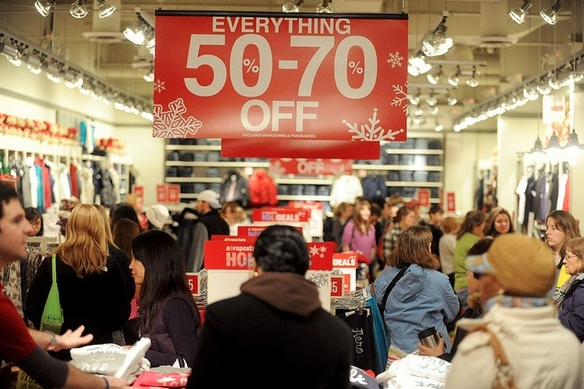Hooked on Stuff: The Black Days of Post-Thanksgiving Consumerism
by Ray Lumpp | November 27, 2012

Black Friday was born from the Golden Era of Capitalism in 1960s America. On the Friday following Thanksgiving—a harvest holiday when Americans consume vast amounts of turkey, stuffing, pie, and wine, watch TV, and appreciate their lives—Americans would flock to the shopping centers of their cities to begin the Christmas shopping season.
The term “Black Friday” originated in Philadelphia by the Police Department to describe the turmoil caused by the flood of people in the late-November slush: traffic jammed the streets; shoppers spilled from over-crowded sidewalks; stores were stampeded from open to close; a black smog drifted through downtown.
Although the police struggled with the holiday phenomenon, merchants looked forward to this time of year, as their financial balances would turn from red (loss) to black (profit)–another reason for the day's colorful name.
Today, the day has taken on a more sinister tone: Black Friday is now a worldwide over-consumption event.
The post-war prosperity of the 1960s allowed Americans many new freedoms, including larger families, suburban houses, and new cars, as well as a sense of pride and optimism for the future: life in America seemed to be getting better all the time. With the increasing availability of goods, Americans began to define themselves through their possessions, through comparing their lives with their neighbors', and the desire to acquire status symbols intensified.
America reached peak oil production in 1970 and underwent a philosophical shift from Keynesian economics to free-market Monetarist economics, heralding an end to the Golden Age of Capitalism, although conspicuous consumption and the pursuit of the “American Dream” continue today.
Black Friday signifies that, if anything, people’s materialistic tendencies have intensified: each year it begins earlier and ends later, and each year more people join in the event, spending increasing amounts of money ($52.5 billion in 2011). This year, Toys R Us, Walmart, Sears, and Kmart opened at 8 p.m. on Thanksgiving Day, operated through the night, and closed the following evening, although many employees protested.
"Black Friday signifies that, if anything, people’s materialistic tendencies have intensified."
Because online shopping has become a popular way to avoid the crushing crowds and sold-out commodity items, more people now celebrate Black Friday (and Cyber Monday) than Thanksgiving, and possibly Christmas—the supposed reason for this wasteful, hollow behavior.
Since 2003, Black Friday has consistently been the biggest shopping day of the year around the world, although many retailers attempt to prolong the sales for as long as possible before Christmas, making it a multi-week affair. The allure of Black Friday is that people of all economic levels like to feel as though they are “getting a good deal” on items they feel socially and culturally obligated to buy.
To minimize the psychological pain that goes along with paying money, many people use credit cards for their purchases, resulting in an ever-heightening number of first-world citizens in debt. If one doesn’t feel enough pain, however, they will shop more. While initially triggered by a need to share love, the failure of shopping to actually meet this need can lead to a cycle of escalation, which humanity is no doubt experiencing on a global scale.
What started as a celebration of prosperity has become something akin to a national addiction. The United States currently uses almost double the amount it produces, consuming the most clothing items, metals, plastics, and electronics. Americans also own 30 percent of the world’s vehicles, but because we drive more with less-efficient cars, we emit nearly half of the world’s vehicle carbon dioxide emissions. We also use 40 times more water per person than those in third-world countries.
Modern Americans are so accustomed to over-consumption that they display two alarming symptoms: obesity rates are the highest in the world and one of the costliest forms of preventable death, and we suffer from “affluenza”—a painful, contagious, socially transmitted condition of overload, debt, anxiety, and waste resulting from an unsustainable addiction to economic growth.
"The 'need' to consume has led to the continual, systematic abuse of Earth’s natural resources at a rate that outpaces the sustainable capacity of our ecosystem."
The “need” to consume has led to the continual, systematic abuse of Earth’s natural resources at a rate that outpaces the sustainable capacity of our ecosystem, and we now face the looming problems of resource depletion, environmental degradation, and reduced ecological health.
The true test of an addict is whether the negative behavior continues despite adverse personal consequences: Americans must slow the rate of consumption to sustainable levels. While shopping online is a passive way to somewhat reduce our carbon footprint, it is simply not enough. There must be a paradigmatic shift in the way we show our love around the holiday season.
Research shows that “experiential gifts” (concert tickets, weekend getaways, books) provide more happiness than material possessions for both the giver and receiver. You can also enrich the experience and self-satisfaction by making all of your gifts by hand. Use recycled materials or buy them second-hand, and think about things that people actually need rather than want. Or ignore the expensive, commercial holiday completely.
The goal is self-sufficiency and simplicity: the power is yours!

